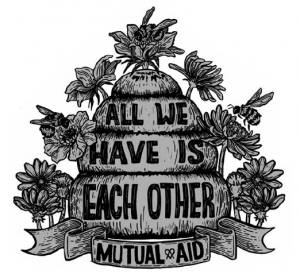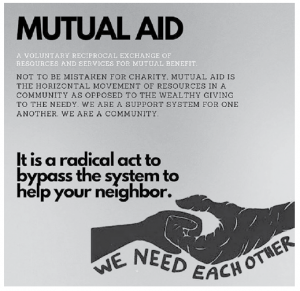Everyone has something to contribute; Everyone has something they need
The COVID-19 pandemic response in the US has challenged communities, as local food banks experienced shortages and shelter beds became even more restricted. Confronted by an uncertain and under-resourced governmental response, many communities countered with energized “mutual aid” organizing. People recognized their common need and decided on a strategy of mutual support. In Olympia, at least four mutual aid groups sprung up, each with a somewhat different focus: MAC, MAP, META, BPI.
Olympia Mutual Aid Collective
(OlyMAC) was started as a Facebook page in March 2020, at the beginning of the stay-at-home orders, by a local teacher. By mid-April, the page had grown to over 3,000 members and now has over 5,000 members. Their goal is to be a bottom up structure of cooperation that meets all expressed needs.
A volunteer with OlyMAC, Audrey Daye, recalls that “in the past year, in addition to the countless asks that have been fulfilled between members on the page itself, we’ve streamed tens of thousands of dollars in direct aid contributions to community members most in need of those funds. Sometimes this aid is in the form of food or Visa cards, to help struggling families get groceries or keep their heat on. Sometimes it’s for things like a refrigerator, or a car battery, or a bus ticket. Sometimes it’s for insulin… It’s everything.”
Another impetus came when Congresswoman Alexandria Ocasio-Cortez and organizer Mariame Kaba called a virtual town hall to support organizing in response to COVID-19. Their toolkit shared that mutual aid is about “getting people to come together to meet each other’s needs, recognizing that as humans, our survival is dependent on one another.”

Olympia Black Power Initiative
The BPI is a project started by the Olympia Black Panthers. “The Black Power Initiative provides emergency financial support in the form of small, low barrier cash grants to black people in need. It’s an attempt to help alleviate the constant crisis that racism, state and civil violence, and marginalization force black people into. To make this possible we need those in our community with white privilege and financial privilege to step into solidarity with us and radically redistribute your finances.”
“You don’t need to subscribe to any particular political philosophy to … share your extra toilet paper or seed starts or receive assistance picking up your prescriptions….”
Shon Meckfessel echoes that mutual aid efforts have been youth of color-led. These serve as an antidote to liberal charity efforts that often perpetuate existing inequalities, are hierarchical and top-down, versus horizontal and relational. Charity often centers the generosity of the donor and their good will, versus the needs and experience of the person receiving support. “By choosing a name [mutual aid] that focuses on relationship, a reciprocal relationship, between people sharing out resources and people who could use those resources—there is a politics that goes with that, prefiguring equality, an egalitarian society, freely helping each other out because that’s what we do. As opposed to charity and literal saviorism or “helping hands” liberalism.”
Mutual Aid Partners (OlyMAP)
OlyMAP grew out of work by Just Housing in response to downtown houseless camp sweeps back in 2018 and 2019. They started Mutual Aid Mondays along with Olympia Assembly and Solidarity Network, and Olympia IWW and Oly Community Medics focusing on the houseless community. Mutual Aid Mondays grew until it was decided to form two organizations—Just Housing to focus on advocacy, and OlyMAP to continue mutual aid work.
MetaCooperative
MetaCooperative is a mutual aid affinity group, founded to focus on resiliency and mutual aid in the event of an ecological disaster. MetaCooperative member G.t. Press shares that “we aspired to be good neighbors, despite distance, and to participate helpfully in each other’s lives, with an understanding that our internal “gift” economy would be the mutual aid that we needed.”
Combining for mutual support isn’t the norm in our society
Audrey at OlyMAC shared that the growing recognition of mutual aid has required larger conversations navigating political differences. “A lot of folks have an impulse to help but don’t have an understanding of mutual aid as a concept… We have lost members who have thought we were too accommodating and not radical enough, and we have lost members who have thought we were too restrictive and too radical. It has been a very challenging balance.”
Mutual aid is a political concept that highlights contradictions in power. “Mutual aid is a paradigm shift away from colonial capitalism and embraces a prefigurative world in which people look out for and support one another,” shares Audrey with OlyMAC.
Robert at OlyMAP also describes how mutual aid goes beyond existing systems to build community connection. “It can be really inspiring. You’re building solidarity with people and encouraging healthy skepticism of government’s ability to take care of us. Charity can miss seeing people. There’s a sense of—you might hand out a meal every week—but if you’re not talking to folk, and building connections, you might be holding onto preconceptions about people. You might not be seeing the ways we can actually help each other. Charity is one-sided, you’re only conceiving of the way you can help that person. Versus, when you build that connection, you can work together, you can accomplish all kinds of things.”
Mutual aid is “solidarity, not charity”
Becca Chrisler, another volunteer with OlyMAP, got involved after looking for ways to connect after moving to Olympia. “I didn’t know what mutual aid was but liked what my friend was telling me about it. It was amazing, the energy of the volunteers was infectious, and so many people brought so many different foods and supplies. It grew from there, after the last Stop The Sweeps campaign by Just Housing Olympia, I got involved in organizing.”
Becca also described the importance of the mutual aid model, as distinct from charity work. “The main concept behind our work is that we approach everything with the residents, we do not assume anything for them or take action without knowing that it is what residents want. We have no one leader or manager; every member volunteer has an equal say and the membership is made up of housed and unhoused folks.”
Meeting challenges in working together during a pandemic
Becca observed that the COVID-19 pandemic presented new challenges to this relational model of mutual aid organizing. “We couldn’t hold meetings in person anymore. A lot of our unhoused members weren’t able to contribute like you could before because their access to technology is more limited.”
Another situation experienced by MAP was due to the pandemic: “A lot of our volunteers are older and concerned about their health. To get around this, (we) came up with volunteer intake forms and held a zoom orientation. The form helped us figure out where we could fit people with their interests and availability. It’s really cool, now we’re trying to figure out how we can expand… for example, crisis supply distribution, supporting self-governance and promoting collaborative garbage cleanups with camp residents have been made stronger in the last year despite COVID.”
This relational and politically centered mode of mutual aid organizing can be challenging. Shon Meckfessel shares that “from my own point of view, it’s a heartbreak how much movements in the days of social media shred themselves with infighting… People are steeped in trauma. All these wonderful groups are.”
To help navigate these dynamics, Becca shares “you gotta take care of yourself before you can take care of the community, and you can take care of community in ways you might not have known otherwise.”
Caring for each other and for yourself, and having fun
What advice is there for people interested in joining mutual aid efforts? Becca shares that you should “Tear down all assumptions and go into it with an open heart and mind. Ask questions, get close, get to know people. It’s hard to see people you care about going through this survival struggle, so also knowing your boundaries is important, always take care of yourself before you extend yourself to others… Because we’ve built relationships with residents, it’s not just they’re asking for help—they’re concerned for my wellbeing and they want to take care of me and know how to help too. It’s a two-way street.”
G.t. Press also shares the importance of self-care and not forgetting to have fun. “Personal health and emotional hygiene are incredibly important when everyone is stressed out and uncertain about the future… [Community] is the fun of life—start there! Fun can look like making food together, enjoying each other’s company, and actually learn from one another—that is the soil from which a functional mutual-aid group will emerge.”
Robert also acknowledges it can be difficult to navigate some of the conflict and real challenges to survival and thriving, but ultimately, “it’s a kind of thing where you’re energized by surprises all the time. Random people will show up [to Mutual Aid Mondays] and I have a ton of supplies for folks at the Jungle, sometimes, say $500 worth of things… it’s the kind of thing that makes me feel fuzzy. This work forges these connections and solidarity which matters. Olympia is… small enough that you can feel the consequences of those connections.”
How to get involved
Black Power Initiative: Please consider donating to the Black Power Initiative; their Cashapp handle is $blackispowerful
MetaCooperative Business Incubator’s public projects:
Visit Earthfarms.fun or earthhomes.design, whose goals are to transform our bioregion into a bastion of biodiversity, a leader in disaster resiliency attuned to ecological principles.
OlyMAC: Join the Facebook page or email olymutualaidcollective@gmail.com. Snail mail works too: OlyMAC ℅ HBA, PO Box 2272, Olympia, WA 98501.
OlyMAP: Contact admin@olymap.org or visit www.olymap.org
Sarah H. Keefe lives in Olympia and has worked for a variety of state and non-profit institutions serving the public.
Structural and political roots of mutual aidThe origins of the term mutual aid has roots in anarchist and social movements, explained Dr. Shon Meckfessel, long-time anarchist organizer and current faculty at Highline College. Some understanding of the term goes back to the 1902 publication of Mutual Aid: A Factor of Evolution by Russian naturalist and anarchist Peter Kropotkin: “Darwinism has been used to justify social inequality, in ways [Darwin] never said. Kropotkin, an admirer of Darwin, pointed out the neglected aspect, that besides competition between species, one of the things that makes species more successful is their ability to cooperate. Our own survival is based on helping each other out.” “You do not need to subscribe to any particular political philosophy to participate in the mutual aid offered and received in this group, like sharing your extra toilet paper or seed starts or receiving assistance picking up your prescriptions or having groceries delivered,” says Audrey at OlyMAC. “However, it is important to understand that mutual aid is historically a radical act, with a rich history that has defined it.” OlyMAC references author Jessica Gordon-Nembhard, who wrote Collective Courage: A History of African American Cooperative Economic Thought and Practice, saying “mutual aid is part of the history of all communities but especially of communities of color that face obstacles accessing resources… In major cities, more than half of Black Americans were part of at least one mutual aid society by the late 1800s.” |
Be First to Comment